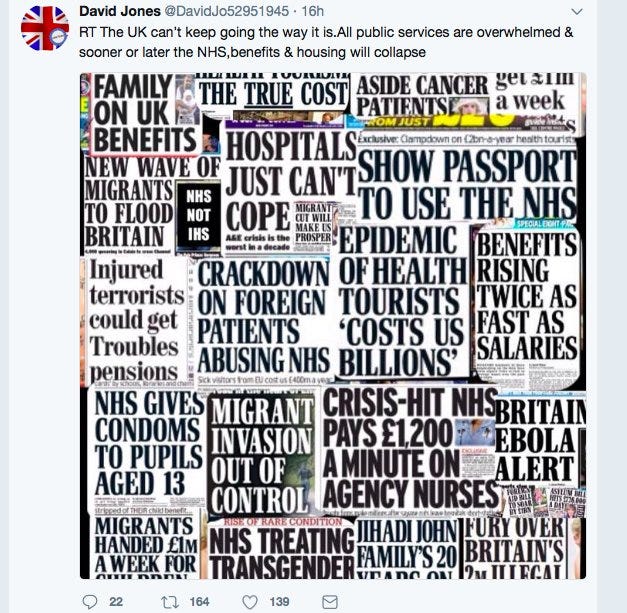The Russian troll who wasn't
A true story of Twitter hysteria spilling over into the real world
You can't escape Twitter. Even if you never go there.
This is the story of an unreliable claim that made its way from Twitter and into the mainstream, via an article I wrote for an anti-Brexit newspaper, a front page headline by someone else in The Times and then an interview I gave to a popular radio show.
It's the story of 'David Jones', a pro-Brexit, pro-UKIP1, strongly conservative person who was extremely active on Twitter.
Can't be bothered reading further? The punchline to this story is that 'David Jones' was a very privacy-conscious guy called Chris, living on the Isle of Wight. He wasn't a Kremlin agent seeking to destabilise the western liberal consensus one tweet at a time.
Kind of reassuring, you'd think. But there were still people who preferred the fictional over the factual version of this tale, last time I checked.
Here's how it all went down.
The Twitter account was @DavidJo52951945 and it drove many of us nuts. By 'us' I mean liberal type people who were against Brexit and didn't like anti-immigrant messages, which 'David' (actually Chris) was fond of sending out all the time. This is representative of his shtick.
Curiosity piqued, I started digging around, using a specialist search tool2 that had proved reliable in the past. It surfaced a phone number 'linked' (according to the tool) in some way to 'DavidJo52951945' somewhere that Google didn’t seem to have indexed. The number was for the office of one David Jones. He was a UKIP councillor for Upper Bann in Northern Ireland. I thought I'd nailed it. Especially when I messaged 'DavidJo52951945' about the connection I’d found and the account operator blocked me from any further interaction.
I interviewed Councillor Jones, who denied being the David Jones on Twitter. The New European ran the story.
A few months later a popular (also anonymous) Twitter data diver published a series of data visualisations showing that DavidJo52951945 was a 'central node' in a network pushing pro-Trump messages and that it was doing so during Moscow office hours.
Lots of people were excited by this. Including The Times, which ran a front page piece on it.
The story broke while I was on holiday but I was only too eager to respond to a call from LBC requesting that I discuss the implications of this in a live interview.
So, suddenly, there I was, pitched into a breaking story about anonymous Twitter accounts being used nefariously by The Kremlin to promote Brexit and Trump and generally poison the information well on social media.
Although I stayed in my own lane and talked only of the principles of 'astroturfing' (creation of an impression of social consensus using fake social media personas) I was certainly contributing to the impression that we were all being jerked around by Russian trolls. Because that's how stories like this work.
In reality, none of us knew who was behind 'DavidJo52951945'. But that Twitter account began taking a lot of heat and it made itself private for a while, then changed its name to 'DavidJoBrexit' and carried on as before.
As it turned out, more talented, patient and tenacious people than me eventually unmasked 'David Jones' and quietly shared their findings with me. He'd left a trail online, as we all do, right back to his student days. I approached him at the end of 2017 for an interview about the whole kerfuffle, but he refused to engage.
I won't doxx him here. What he says, within the rules of the platforms he uses, is his business. And who he is also remains his business alone. As far as I know he's just a guy with extremely conservative views. They are distasteful to me and that's it.
What has stayed with me from this episode is how vulnerable we are to misinformation. All of us. And yet, back in those unsettling times of the Brexit referendum aftermath and the early months of the Trump presidency, those of us in the liberal camp sincerely believed that 'fake news' was a right wing phenomenon.
It also revealed how keen we are to cling to our initial perceptions and beliefs. When I attempted to explain on Twitter sometime later that 'DavidJo' had not really been a Russian troll someone insisted that the only way to persuade them of this would be for me to reveal the real person. They insisted that "extraordinary claims require extraordinary evidence".
In their mind, it was more extraordinary to claim that an ordinary person was sending those tweets than a Kremlin agent.
The other lesson here is how Twitter contaminates the traditional media. The story of DavidJo52951945 was a fringe concern among those of us who spent too much time online. Until suddenly it wasn't. And it was in the newspapers (not just The Times) and on the radio.
And then, for a long time (and possibly even now - I wouldn't know, thank goodness) just about anyone who tweeted on certain topics was assumed to be Russian. Especially if they had lots of random digits in their name. The rote response 'how's the weather in St Petersburg' became famous - especially as a stick to beat credulous liberals with.
Another thing is that you can go mad with this stuff. At various times I was certain (based on language patterns) that DavidJo was a woman, that he might be Arron Banks3 and probably lots of other theories I’ve since forgotten.
And, in a way, it’s not really over for me. I still want to speak with Chris, so I'll keep trying. After all, we were both part of the problem and I wonder what he’s learned from the episode.
For the benefit of non-UK readers here’s what UKIP is https://en.wikipedia.org/wiki/UK_Independence_Party
Pipl https://pipl.com/
https://en.wikipedia.org/wiki/Arron_Banks
Credit for the header image goes to Pixabay user geralt







